
U2 are an Irish rock band from Dublin, formed in 1976. The group consists of Bono, the Edge, Adam Clayton, and Larry Mullen Jr.. Initially rooted in post-punk, U2's musical style has evolved throughout their career, yet has maintained an anthemic quality built on Bono's expressive vocals and the Edge's chiming, effects-based guitar sounds. Their lyrics, often embellished with spiritual imagery, focus on personal and sociopolitical themes. Popular for their live performances, the group have staged several ambitious and elaborate tours over their career.

Pop is the ninth studio album by Irish rock band U2. It was produced by Flood, Howie B, and Steve Osborne, and was released on 3 March 1997 on Island Records. The album was a continuation of the band's 1990s musical reinvention, as they incorporated alternative rock, techno, dance, and electronica influences into their sound. Pop employed a variety of production techniques that were relatively new to U2, including sampling, loops, programmed drum machines, and sequencing.

"Where the Streets Have No Name" is a song by Irish rock band U2. It is the opening track from their 1987 album The Joshua Tree and was released as the album's third single in August 1987. The song's hook is a repeating guitar arpeggio using a delay effect, played during the song's introduction and again at the end. Lead vocalist Bono wrote the lyrics in response to the notion that it is possible to identify a person's religion and income based on the street on which they lived, particularly in Belfast. During the band's difficulties recording the song, producer Brian Eno considered erasing the song's tapes to have them start from scratch.
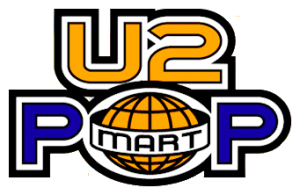
The PopMart Tour was a worldwide concert tour by rock band U2. Staged in support of the group's 1997 album Pop, the tour's concerts were performed in stadiums and parks in 1997 and 1998. Much like the band's previous Zoo TV Tour, PopMart was an elaborate production. Its lavish stage design had a 165-foot-wide (50 m) LED screen, a 100-foot-high (30 m) golden arch, and a large mirror-ball lemon. As with the Zoo TV Tour, the band delivered an image and performance that were ironic and self-mocking on PopMart, deviating from their earnest performances of the 1980s; the band performed in costumes that, along with the stage design, poked fun at the themes of consumerism and pop culture.

"I Will Follow" is a song by rock band U2. It is the opening track from their debut album, Boy, and it was released as the album's second single in October 1980. Lead singer Bono wrote the lyrics to "I Will Follow" in tribute to his mother, who died when he was 14 years old.

"Staring at the Sun" is a song by Irish rock band U2. It is the fifth track on their 1997 album, Pop, and was released as its second single on 14 April 1997. It peaked at number three on the UK Singles Chart, number one in Canada and Iceland and number 26 on the US Billboard Hot 100. In the US, it topped the Billboard Modern Rock Tracks and Adult Alternative Songs charts. It also reached the top 10 in Finland, Ireland, Italy, New Zealand and Norway.
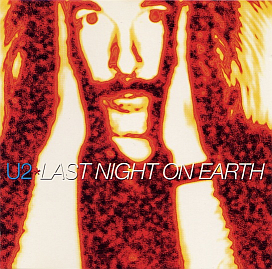
"Last Night on Earth" is a song by Irish rock band U2. It is the fifth track on their 1997 album, Pop, and was released as its third single on 1 July 1997. The song features excerpts from "Trayra Boia", written by Naná Vasconcelos and Denise Milan.
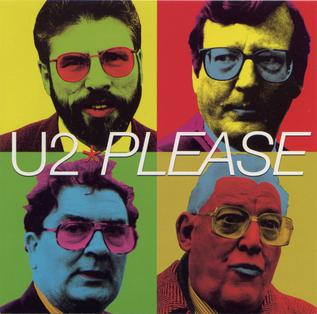
"Please" is a song by Irish rock band U2. It is the eleventh track on their ninth album, Pop (1997), and was released as its fourth single on 20 October 1997. As with "Sunday Bloody Sunday", the song is about The Troubles in Northern Ireland. The single cover for this song features pictures of four Northern Irish politicians – Gerry Adams, David Trimble, Ian Paisley, and John Hume. Two months before the release of the single, live versions of "Please" and three other songs from the PopMart Tour were released on the Please: PopHeart Live EP in September 1997.

"If God Will Send His Angels" is a song by Irish rock band U2. It is the fourth track on their 1997 album, Pop, and was released as its fifth single on 8 December 1997. It was also featured on the City of Angels soundtrack.

"Mofo" is a song by Irish rock band U2. It is the third track on their 1997 album Pop, and was released as the album's final single on 8 December 1997. The song was partially written about lead vocalist Bono's mother, who died when he was 14 years old. Other songs which Bono wrote about his mother include "Lemon", "I Will Follow", "Iris " and "Tomorrow".

"The Fly" is a song by Irish rock band U2. It is the seventh track from their 1991 album, Achtung Baby, and it was released as the album's first single on 21 October 1991. "The Fly" introduced a more abrasive-sounding U2, as the song featured danceable hip-hop beats, industrial textures, distorted vocals, and an elaborate guitar solo. Lead vocalist Bono described the song as "the sound of four men chopping down The Joshua Tree", due to its departure from the traditional sound that had characterised the band in the 1980s.
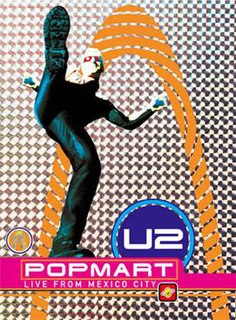
PopMart: Live from Mexico City is a concert film by Irish rock band U2. It was shot on 3 December 1997 at Foro Sol in Mexico City, Mexico, during their PopMart Tour. It was released on VHS and Video CD in November 1998, and was re-released in September 2007 on DVD. It was nominated for the Grammy Award for Best Long Form Music Video in 2000. Select songs from the release were featured on the 2000 live album Hasta la Vista Baby! U2 Live from Mexico City.
"Bullet the Blue Sky" is a song by Irish rock band U2, and is the fourth track from their 1987 album The Joshua Tree. Lyrically, the song was inspired by a trip that lead vocalist Bono made to Nicaragua and El Salvador, where he saw firsthand how local peasants were affected by United States military intervention in the region. Angered by what he witnessed, Bono asked guitarist the Edge to "put El Salvador through an amplifier." "Bullet the Blue Sky" is one of the band's most overtly political songs, with live performances often being heavily critical of political conflicts and violence.
"Until the End of the World" is a song by rock band U2 and the fourth track from their 1991 album Achtung Baby. The song began as a guitar riff composed by lead vocalist Bono from a demo, which the band revisited with success after talking with German filmmaker Wim Wenders about providing music for his film Until the End of the World. The song's lyrics describe a fictional conversation between Jesus Christ and Judas Iscariot. The first verse discusses the Last Supper; the second is about Judas identifying Jesus with a kiss on the cheek in the Garden of Gethsemane; and the final is about Judas' suicide after being overwhelmed with guilt and sadness.
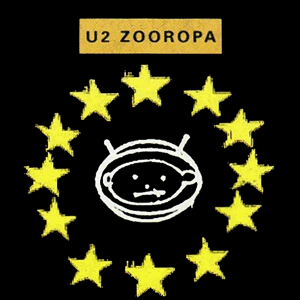
"Zooropa" is a song by Irish rock band U2, and is the opening track from their 1993 album of the same name. The song was the result of combining two pieces of music, the first of which was conceived in the studio, and the second of which was a soundcheck recording from one of the group's concert tours that was discovered by guitarist the Edge. The lyrics were written by lead vocalist Bono and describe two characters in a brightly lit city in a futuristic version of European society. Some lyrics in the song were taken directly from advertising slogans, and they also featured the phrase "dream out loud", which has appeared in other U2 media. The song touched on several themes, including moral confusion and the future of European society.

"Sunday Bloody Sunday" is a song by Irish rock band U2. It is the opening track from their 1983 album War and was released as the album's third single on 21 March 1983 in the Netherlands and West Germany. "Sunday Bloody Sunday" is noted for its militaristic drumbeat, harsh guitar, and melodic harmonies. One of U2's most overtly political songs, its lyrics describe the horror felt by an observer of the Troubles in Northern Ireland, mainly focusing on the 1972 Bloody Sunday incident in Derry where British troops shot and killed unarmed civil rights protesters. Along with "New Year's Day", the song helped U2 reach a wider listening audience. It was generally well received by critics on the album's release.
This is a timeline of the history of rock band U2:
"Mothers of the Disappeared" is a song by Irish rock band U2. It is the eleventh and final track on their 1987 album The Joshua Tree. The song was inspired by lead singer Bono's experiences in Nicaragua and El Salvador in July 1986, following U2's participation in the Conspiracy of Hope tour of benefit concerts for Amnesty International. He learned of the Madres de Plaza de Mayo, a group of women whose children had "forcibly disappeared" at the hands of the Argentine and Chilean dictatorships. While in Central America, he met members of COMADRES, a similar organization whose children had been abducted by the government in El Salvador. Bono sympathized with the Madres and COMADRES and wanted to pay tribute to their cause.
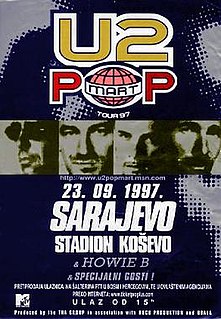
On 23 September 1997, the Irish rock band U2 held a concert at Koševo Stadium in Sarajevo, Bosnia and Herzegovina, as part of the group's PopMart Tour. They were the first major artist to hold a concert in the city after the end of the Bosnian War. Approximately 45,000 fans attended the show.

"Stay " is a song by rock band U2. It is the fifth track on their 1993 album, Zooropa, and was released as the album's third single on 22 November 1993. The song reached number one in Ireland and reached the top 10 in Australia, Iceland, the United Kingdom, and several other countries. The music video was shot in Berlin, Germany. The earliest incarnation of the song developed during sessions for the group's 1991 album Achtung Baby. It was written for and inspired by Frank Sinatra and bore his surname as the original working title. An alternative recording was used in the Wim Wenders film Faraway, So Close!.
















